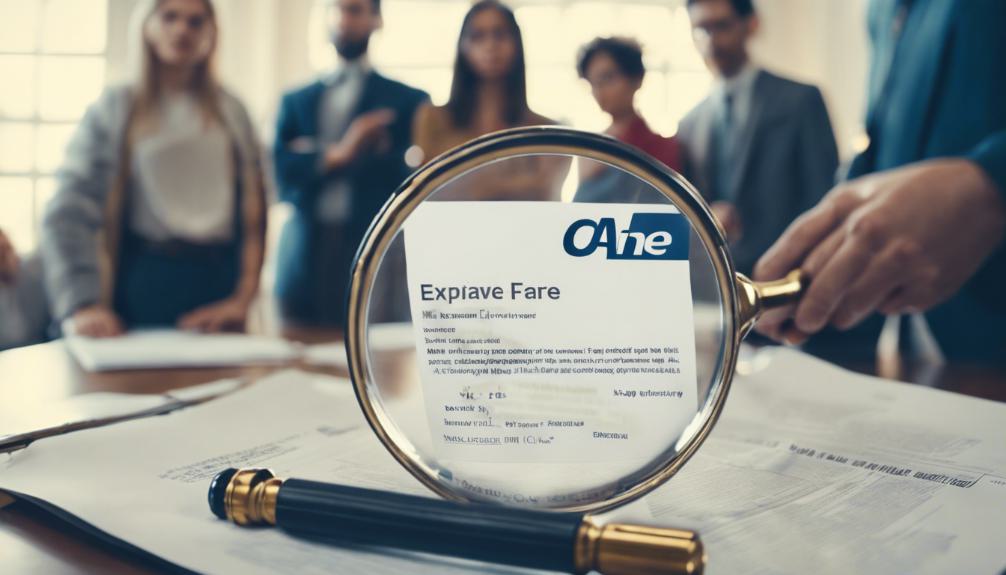Capital One Faces Deceptive Practice Lawsuit
The recent class action lawsuit against Capital One, alleging deceptive practices and violations of the Fair Credit Reporting Act, highlights a pivotal moment for consumer rights and financial transparency. As the case unfolds, it brings to the forefront questions regarding the ethical obligations of financial institutions in their dealings with consumers—especially in how they manage and utilize credit information. This situation not only underscores the potential repercussions on individuals' credit scores but also raises broader concerns about the reliability and integrity of credit reporting practices. As we examine the intricacies of this lawsuit, it becomes imperative to contemplate its implications on future financial transactions and consumer trust.
Key Takeaways
- Capital One is sued for alleged bait-and-switch tactics violating consumer protection laws.
- Plaintiffs experienced credit score drops after applying, impacting their financial health.
- The lawsuit invites others affected by hard credit pulls to assess their case eligibility.
- Misleading information about credit score risks and a related data breach are central concerns.
Legal Allegations Overview

Capital One is currently facing a class action lawsuit for alleged deceptive practices, specifically employing bait-and-switch tactics that violate the Fair Credit Reporting Act and other related consumer protection laws. This legal action underscores the importance of vigilance and advocacy in protecting consumer rights, especially in the financial sector where trust and reliability are paramount. The plaintiffs allege that their credit scores were adversely affected following what they understood to be an unintentional application for a Capital One credit card, highlighting a significant concern over the transparency and integrity of credit-related processes. This case serves as a pivotal reminder for individuals and communities alike to remain informed and proactive in safeguarding their financial well-being against potentially misleading practices.
Class Action Lawsuit Explained

Building on the overview of legal allegations against Capital One, this section will provide a detailed explanation of the class action lawsuit, including its background, claims, and implications for consumers. Initiated due to alleged deceptive practices, specifically a bait-and-switch tactic violating the Fair Credit Reporting Act and related legislation, this lawsuit represents individuals who experienced unanticipated credit score drops after applying for Capital One products. The suit underscores a pivotal opportunity for consumers, who were unknowingly subjected to hard credit inquiries, to seek justice and reparation. It emphasizes the importance of transparency in financial transactions and the protection of consumer rights, aiming to hold Capital One accountable for the alleged misinformation and its impacts on consumers' financial well-being.
Credit Score Impact Assessment

Understanding the nuances of how a credit score can be affected by unauthorized hard inquiries is critical for consumers, especially in light of recent allegations against financial institutions. The impact of such inquiries extends beyond mere numerical drops; it can affect consumers' ability to secure favorable loan terms, credit cards, or even housing. Given the recent class action lawsuit filed against Capital One, alleging deceptive practices that led to unauthorized hard credit pulls, it's imperative for individuals to monitor their credit reports vigilantly. These allegations underscore the importance of being informed about one's credit health and the potential ramifications of unauthorized inquiries. Consumers dedicated to serving others and enhancing communal financial literacy can play a pivotal role in advocating for transparency and accountability from financial institutions.
Understanding Hard Credit Pulls

A hard credit pull, often initiated by lenders to assess a borrower's creditworthiness, can greatly impact an individual's credit score. This thorough credit check is a standard part of the lending process, signifying a serious inquiry into one's financial history. While necessary for obtaining loans or credit cards, each hard pull can slightly lower a credit score, reflecting the potential risk of new debt. It's important for individuals to understand this process, as it underscores the importance of thoughtful financial planning and responsible credit management. By being informed about the implications of hard credit pulls, consumers can make more empowered decisions, aiding in their journey towards financial stability and protecting their credit health in the service of their long-term goals.
The Bait-and-Switch Allegation

Facing allegations of a bait-and-switch tactic, Capital One has come under legal scrutiny for potentially misleading consumers during the credit card application process. This legal action highlights a notable concern where individuals are led to believe one thing while the reality greatly differs, impacting their financial well-being and credit scores. The essence of this lawsuit is to bring attention to practices that may harm consumers' trust and financial health. By focusing on these allegations, the aim is to guarantee transparency and fairness in the credit application process. It serves as a reminder of the importance of integrity in financial services, encouraging companies to uphold high standards for the benefit of consumers seeking to make informed decisions in their financial endeavors.
Consumer Rights and Protections

Building on the concerns raised by the bait-and-switch allegations against Capital One, it is imperative to examine the broader landscape of consumer rights and protections in financial transactions. These rights are foundational to ensuring fair play and transparency in the financial industry, safeguarding consumers from deceptive practices that can adversely affect their financial health. It is essential for individuals to be aware of their rights and the mechanisms available for recourse should those rights be violated. This awareness empowers consumers to make informed decisions and take appropriate action in defending their financial interests. Additionally, it underscores the importance of vigilance and proactive engagement in financial matters, highlighting the role of informed consumer action in upholding the integrity of financial transactions and practices.
The Role of Fair Credit Reporting Act

The Fair Credit Reporting Act (FCRA) serves as a critical safeguard, aiming to guarantee the accuracy, fairness, and privacy of information in the credit reporting agencies' files. Enacted to protect consumers, the FCRA imposes strict guidelines on credit reporting agencies, creditors, and others who report credit information. It assures that individuals have the right to view their credit report, dispute inaccuracies, and be informed of the use of their credit information in adverse actions, such as denial of credit or employment. For those dedicated to aiding others, understanding and advocating for these rights under the FCRA can make a significant difference in ensuring fair treatment in the credit system and protecting consumers from potential abuses.
Experiences With Credit Score Changes

Many consumers have reported unexpected fluctuations in their credit scores following certain financial actions, sparking concerns and discussions about the underlying causes and potential remedies. These fluctuations, often after applying for financial products or services, have raised questions about the fairness and transparency of credit score calculations. Affected individuals seek clarity on how their financial behavior impacts their creditworthiness, emphasizing the need for accurate and fair credit reporting practices. This situation underscores the importance of consumer education on credit management and the legal obligations of financial institutions to maintain integrity in their operations. As the community grapples with these issues, the collective aim is to make sure that credit score changes are reflective of true financial behavior, thereby fostering trust and confidence in financial systems designed to serve the public's best interest.
Eligibility Criteria for Plaintiffs

Understanding the eligibility criteria for plaintiffs is a pivotal step for consumers affected by the alleged deceptive practices of Capital One, particularly those who have experienced unexpected changes in their credit scores. Individuals who have seen their credit scores drop as a result of hard credit inquiries initiated without their full understanding or consent may qualify. This includes those who applied for a Capital One product and subsequently faced a credit score decline, specifically between 7 to 10 points, due to what is claimed as bait-and-switch tactics. It's imperative for potential plaintiffs to review their credit reports and application history with Capital One. By doing so, they can ascertain whether their situation aligns with the class action lawsuit's parameters, thereby enabling them to pursue justice and possible compensation for the alleged deceptive practices.
Data Breach Repercussions

Data breach incidents, particularly the one involving Planet Home Lending as mentioned in the lawsuit against Capital One, have significant ramifications for consumers' credit scores and overall financial security. These repercussions extend beyond mere numbers on a credit report; they embody a potential long-term financial strain for individuals affected by such breaches. The decrease in credit scores can lead to higher interest rates on loans and credit cards, thereby increasing the cost of borrowing for consumers. Moreover, the breach undermines the trust individuals place in financial institutions to secure their personal and financial information. For those dedicated to aiding others, understanding the depth of impact these breaches have on financial wellbeing is important. It empowers them to provide better support, guidance, and advocacy for those compromised by such security failures.
Misinformation and Consumer Trust

In an era where trust in financial institutions is paramount, the alleged misinformation by Capital One regarding credit score impacts severely undermines consumer confidence. At the heart of this issue lies the fundamental expectation of transparency and honesty that consumers hold towards their financial service providers. When individuals entrust their personal and financial information to a bank, they do so with the belief that their interests will be safeguarded and their financial well-being prioritized. Misleading practices, particularly those affecting something as critical as credit scores, not only jeopardize individual financial stability but also erode the collective trust in the financial ecosystem. For those committed to serving others, the importance of maintaining this trust cannot be overstated—as it is the cornerstone upon which equitable and responsible financial practices are built.
Legal Remedies and Justice

Amid rising concerns over deceptive practices undermining consumer trust, the pursuit of legal remedies and justice becomes paramount for those affected by the alleged bait-and-switch tactics of Capital One. The class action lawsuit represents a critical avenue for holding the financial institution accountable, aiming to rectify the wrongs done to consumers. It underscores the importance of vigilance and legal recourse in protecting consumer rights and the integrity of credit systems. By highlighting the alleged violations of the Fair Credit Reporting Act and other related laws, this legal action not only seeks compensation for the affected individuals but also aims to deter similar practices in the future, ensuring a fairer and more transparent financial landscape for all.
Engaging Affected Individuals

Several strategies are being implemented to actively engage individuals potentially impacted by Capital One's alleged deceptive practices. Open forums, digital platforms, and direct outreach programs are in place, ensuring affected consumers are not only informed but also empowered to take action. These initiatives are designed with a deep understanding of the distress and confusion that financial discrepancies can cause. By providing clear, accessible information and support, the aim is to demystify legal processes and encourage affected individuals to assess their situation. Additionally, mechanisms for sharing personal experiences and receiving guidance on potential legal redress are being streamlined. This approach underscores a commitment to not just addressing the immediate concerns but also fostering a culture of transparency and accountability in consumer financial interactions.
Learning From the Capital One Case

Reflecting on the strategies to engage affected individuals highlights the importance of learning from the Capital One case to better understand consumer rights and the impact of financial practices. This instance serves as a critical reminder of the need for vigilance in financial dealings and the protection of personal credit information. Professionals dedicated to serving others can draw lessons on the importance of transparency, the ethical handling of consumer credit information, and the proactive education of individuals about their rights and the potential consequences of financial applications. It underscores the significance of fostering an environment where trust is paramount, and consumer protection is not just an afterthought but a foundational principle. This case becomes a pivotal learning opportunity for advocating stronger consumer rights and ethical financial practices.
Seeking Redress for Deceptive Practices

The lawsuit against Capital One highlights the critical avenue of legal action for consumers seeking redress for deceptive practices. This legal battle underlines the importance of accountability and the role of the judiciary in upholding consumer rights. Individuals who have experienced similar infringements on their rights have a pathway to challenge unfair practices and seek compensation. The case emphasizes the significance of understanding one's rights and the mechanisms available for protection and redress. By taking legal action, affected consumers not only pursue justice for themselves but also contribute to the broader effort of safeguarding consumer interests against deceptive corporate tactics. This collective pursuit of justice serves as a powerful reminder of the strength individuals hold when they come together to challenge wrongdoing and advocate for fairness and transparency in business practices.
Frequently Asked Questions
What Alternative Dispute Resolution Options Are Available to Consumers Before Joining the Class Action Lawsuit Against Capital One?** This Question Explores Potential Mediation or Arbitration Routes That Affected Consumers Might Consider or Have Available Before Committing to the Legal Process of a Class Action Lawsuit.
Before pursuing a class action lawsuit, consumers have alternative dispute resolution options such as mediation and arbitration. Mediation involves a neutral third party facilitating a mutual agreement between the consumer and the company. Arbitration, on the other hand, requires a neutral arbitrator to make a binding decision after hearing both parties' arguments. These methods can offer a less adversarial and more cost-effective way to resolve disputes compared to traditional litigation.
How Does Participating in a Class Action Lawsuit Affect a Consumer's Ability to Open New Lines of Credit or Loans in the Future?** This Question Delves Into the Possible Impacts of Being Part of a Lawsuit Against a Major Financial Institution on an Individual's Creditworthiness or Relationship With Other Banks and Credit Issuers.
Participating in a class action lawsuit, while an important legal recourse, does not directly impact an individual's credit score or their ability to open new lines of credit or loans in the future. Financial institutions assess creditworthiness based on credit history, income, and debt levels, not legal actions taken. However, it's essential for consumers to remain informed and vigilant about their credit health during any legal proceedings to mitigate potential indirect effects.
Can Consumers Who Have Previously Settled Disputes With Capital One Individually Still Join the Class Action Lawsuit?** This Question Seeks to Clarify the Eligibility of Consumers Who Might Have Already Engaged in Direct Resolution Efforts With Capital One but Are Considering Joining the Broader Legal Action for Potentially Greater Compensation or Resolution.
Individuals who have previously settled disputes with Capital One might ponder their eligibility for joining the class action lawsuit. It's striking that consumer disputes, even those resolved individually, do not necessarily preclude participation in collective legal actions. This becomes particularly relevant given that a significant portion of affected consumers experience an average credit score drop of 7 to 10 points post-application, underscoring the importance of unified legal efforts to address widespread concerns and seek all-encompassing redress.
What Measures Can Consumers Take to Protect Their Credit Scores While Awaiting the Lawsuit's Outcome?** This Question Addresses Proactive Steps or Strategies Individuals Can Implement to Mitigate Any Further Damage to Their Credit Scores or Financial Reputation During the Potentially Lengthy Legal Proceedings.
To safeguard credit scores while legal proceedings are underway, consumers are advised to regularly monitor their credit reports for inaccuracies, promptly dispute any erroneous entries, and maintain responsible credit habits, such as timely payments and low credit utilization ratios. Engaging with financial counseling services can also provide personalized advice tailored to individual circumstances. These proactive measures can help minimize potential impacts on financial health during the course of litigation.
How Will the Lawsuit Address Consumers Who Experienced a Credit Score Drop but Did Not Directly Apply for a Capital One Product?
In addressing the concerns of consumers who witnessed a decline in their credit scores without directly applying for a Capital One product, the lawsuit seeks to establish a precedent. By meticulously examining the instances of unintentional applications and the subsequent unauthorized hard credit inquiries, this legal action aims to rectify the damages suffered. It underscores the importance of transparency and accountability in financial practices, serving as a guardian of consumer rights and financial integrity.
Conclusion
To sum up, the class action lawsuit against Capital One serves as a beacon, illuminating the treacherous waters of consumer finance where deceptive practices may lurk. It underscores the paramount importance of vigilance and informed decision-making by consumers in safeguarding their financial health against potential pitfalls. This case not only seeks justice for the aggrieved but also fosters a broader comprehension of consumer rights, urging a collective stride towards transparency and accountability in financial transactions.

This post has been generated by AI and was not reviewed by editors. This is Not legal advice. Please consult with an attorney.

